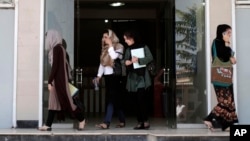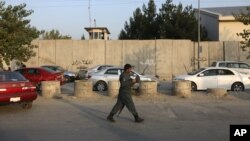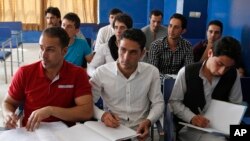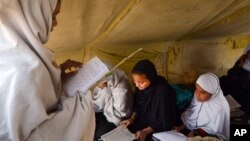Militants are increasingly targeting young professionals, schools, and educated members of society in Afghanistan and neighboring Pashtun areas in Pakistan. Experts say the tactic is aimed at increasing the number of uneducated youth – a prime demographic targeted by militant group recruiters.
Hundreds of educated Afghans have died in terrorist attacks, and dozens of schools have been bombed, burned, or closed by the Taliban and other insurgent groups. Militants last month stormed the American University of Afghanistan in Kabul, killing several students and faculty members.
The university attack took place not long after two university professors, an American and an Australian, were kidnapped while on their way to work. Attacks on the educational elite have been stepped up too in neighboring Pakhtunkhwa and northern Balochistan in Pakistan.
At least 65 lawyers were killed last month and more than 80 injured in a suicide bombing in Quetta, the capital city of the restive Baluchistan province. The attack, claimed by both theTaliban and Islamic State, targeted highly educated professionals dedicated to helping rid their societies of extremism, illiteracy and poverty.
After a deadly attack on the Bacha Khan University in Charsadda earlier this year that killed at least 21 people – mostly students – a Taliban faction vowed to target schools throughout the country.
Attacking ‘fabric of Afghan society’
Analysts say by targeting students and education centers, militants are aiming at the heart of the society by depriving its younger generation of acquiring education and global reach.
“This was not just an attack on an institution; it was an attack on the fabric of Afghan society, on a generation, on the country’s future,” Lael Mohib, former chief of staff at the American University and spouse of Afghanistan’s ambassador to the United States, wrote in a New York Times op-ed.
“By targeting schools, terrorists take aim at a nation's best and brightest, and more broadly at its future,” Michael Kugelman, a senior researcher at the Woodrow Wilson Center told VOA. “There's nothing more demoralizing and tragic than trying to take out younger generations, and particularly in Afghanistan and Pakistan, which are extremely young demographically.”
A systematic “decapitation” of the educated Pashtun society has been carried out through several phases, according to Khadim Hussain, a Peshawar-based security analyst and author of the book "The Militant Discourse" - Religious Militancy in Pakistan.
Creating ‘vacuums’
Militants are especially keen on destroying the educational system and leaving young students with no learning possibilities, making them susceptible to recruitment by militant groups, Hussain said.
“In the beginning, secondary educational institutions were targeted in a very large number which created a large pool of recruits for the terrorist syndicates from out of school children,” Hussain told VOA. “The social and political leadership and cultural practitioners were targeted in the second stage. The attacks were meant to create social, cultural and political vacuums.”
And educated professionals say militants are achieving that goal. “People here are saying we will need another 50 years to fill this vacuum, but I think it is a much bigger loss and will be difficult to repair,” Nasibullah Achakzai, a Pakistani lawyer, told Radio Free Europe after the Quetta attack.
Students too fear their future is being threatened by militants.
“Terrorists target our educational institutions to keep Afghans away from obtaining education,” American University student Sadeequllah Ahmadzai told VOA.
Progress but not enough
Afghans have made steady strides in education since Taliban was driven from power in 2001 and girls were allowed to attend school. A decade later, the World Bank said 7.8 million students were enrolled in schools – about 2.9 million of them girls. But the country’s literacy rate remains low – about 39 percent. As of 2013, roughly half of the teachers do not meet the international education standards, according to Afghanistan’s then deputy minister of education, Asif Nang.
Pakistan is some 50 years behind in its primary and 60 years behind in secondary education targets, according to a recent United Nations report. The literacy rate in poor rural areas stands at 14 percent for females and 64 percent for males. Nearly seven million Pakistani youth do not attend school.
While militants continue to target the educated, students say the only way they know to fight back is by staying in school. “We won't give up our studies, even if there's another attack,” American University student Roman Dehsabzi told Radio Free Europe. “We will continue our studies. I'm not afraid.”













